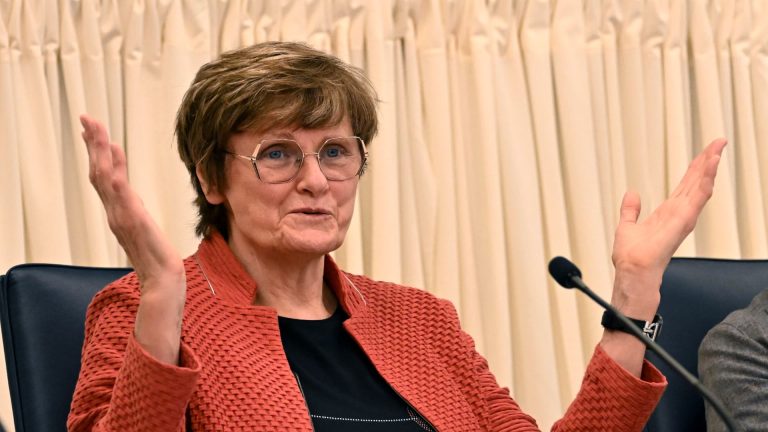It took only a few hours for the BioNTech-Pfizer Covid-19 vaccine to be created. Moderna created its Covid vaccine in two days.
Katalin Karikó, a biochemist and researcher, started working on the science that made both of them possible in 1989.
On Monday, Karikó, along with her collaborator Drew Weissman, won the Nobel Prize in Physiology and Medicine. But her journey to prestige has been punctuated with more hurdles than catalysts.
“I was demoted four times,” Karikó, 68, tells CNBC Make It of her time at the University of Pennsylvania, where she was a research assistant professor before eventually being pushed out.
Karikó says her interest in mRNA, the genetic messenger that sends DNA instructions to make specific proteins, was often dismissed. While she thought it had “promise,” many scientists didn’t see her vision, which made it difficult for her to obtain grant money, she says.
The University of Pennsylvania did not respond to CNBC Make It’s request for comment.
It’s clear, and impressive, that Karikó didn’t take those obstacles personally.
“Don’t focus on what you cannot change,” she says. “Because you are fired, don’t start to feel sorry for yourself. You just have to focus on what’s next because that’s what you can change.”
‘I always emphasize the positive’
Karikó relates her setbacks like facts instead of tragedies.
Born in Hungary, Karikó earned her Ph.D. at the University of Szeged and did her postdoctoral work at its Biological Research Center. After a few years, the university ran out of money and eliminated her position.
“We were out of money, so that’s it,” she says.
Then, Temple University biochemistry professor Robert J. Suhadolnik invited her to be a postdoctoral student in Philadelphia. She, her husband, and her two-year-old daughter Susan immigrated in 1985.
A few years after she and Suhadolnik began working together, she got another job offer, which she accepted. Suhadolnik didn’t receive the news well, she says. According to Gregory Zuckerman’s 2021 book “A Shot to Save the World,” Suhadolnik told immigration officials that Karikó was living in the country illegally, and she had to hire a lawyer to fight deportation; as a result of the legal issues, the new employer withdrew its job offer.
Still, she says she was never angry with Suhadolnik, who died in 2016. “I learned so much, and I always emphasize the positive. He was just upset that after three years I had a job offer somewhere else. … But when I went back years later, I gave a lecture. He was there, and I was thankful. So I’m just grateful he invited me to this country and I could do things.”
Don’t focus on what you cannot change. Because you are fired, don’t start to feel sorry for yourself. You just have to focus on what’s next because that’s what you can change.
Katalin Karikó
Biochemist and researcher
After one year at the Uniformed Services University of the Health Sciences, in Bethesda, Maryland, she got a job offer at the University of Pennsylvania.
At UPenn, she often struggled to get grants and bounced from lab to lab.
In medical school in the United States, researchers are responsible for applying for grants to fund their work. If you’re not doing research, you need to teach or work with patients. Karikó says she wasn’t doing the latter two and her grant money was not coming in.
“If I don’t bring in the money I don’t deserve the working space,” she says. “So that’s the rule. Every university is like that.”
After her Nobel Prize win brought out stories of her career struggles, those in the academic community were quick to point out how hard it is for researchers in the U.S., especially those from another country, to fund their research.
You’re more likely to get grants if you’re a tenured faculty member, but you’re more likely to get promoted to tenure if you get grants, Eric Feigl-Ding, an epidemiologist at the New England Complex Systems Institute told CNBC Make It. Feigl-Ding was formerly a faculty member and researcher at Harvard Medical School.
“There is a vicious cycle,” he says.
If you’re an immigrant, it’s even more difficult to get tenure, Feigl-Ding says: “There are biases. If you have a Ph.D. from an American Ivy League [university], that’s better compared to if you have a degree from a foreign university.”
Universities also tend to look at how much a researcher publishes, or how widely covered by the media their work is, as opposed to how innovative the research is.
The type of work Karikó does, Feigl-Ding says, doesn’t make splashy headlines, because groundbreaking work rarely does.
“Nobel Prizes are slow, tedious, methodical lab work,” he says. “Albert Einstein didn’t publish that many papers. But in this day and age volume is king.”
Karikó, too, knows that a lack of name recognition was a hindrance for her.
“Nobel prizes are slow, tedious, methodical lab work. Albert Einstein didn’t publish that many papers. But in this day and age volume is king.”
Eric Feigl-Ding
epidemiologist at the New England Complex Systems Institute
“I was nobody,” she says. “I was not a famous speaker. So many immigrant scientists are like that. Every time when I get an award, I am thinking about them. Why I didn’t stop researching is because I did not crave recognition.”
None of these setbacks dulled her interest in mRNA or embittered her about the scientific community, she says.
“You don’t have to hold a grudge against somebody, because it poisons you and the other person won’t even remember,” she says.
Instead, she chooses to focus on the scientists who did see potential in her work, such as Weissman. When she ran into him at a photocopier shortly after his arrival at UPenn in 1997, he told her he wanted to make an HIV vaccine. She said she could do that.
Their paper on how mRNA might be used to deliver new instructions to diseased cells was published in 2005 and met with no fanfare. In 2008, an assistant professor at Harvard Medical School stumbled across it and elaborated on it to publish his own research in 2010, crediting both Karikó and Weissman.
In 2013, Karikó joined BioNTech, which was later tasked with designing the Covid-19 vaccine.
‘I felt successful when others considered me unsuccessful’
Karikó’s career seems like an exercise in rejection. What kept her going, she says, wasn’t that she felt like her long hours would eventually pay off with worldwide recognition, but that she didn’t care if they did. There was constant progress, she says, even if it wasn’t noticed or celebrated.
“I felt successful when others considered me unsuccessful because I was in full control of what I was doing,” she says.
When she talks to younger generations, she emphasizes that they should just focus on the work. If you learn something new, that’s a win.
“Young ones are always comparing themselves to each other,” she says. “Like, ‘Oh, he works less and is advancing more and getting more money.’ It is such a distraction. There will always be somebody who is the favorite. If I would have paid attention to the fact that I’m there on Saturday and Sunday and these people are not there and they get money and get the grants and they are promoted and they are not knowing so many things, then I wouldn’t be here.”
She credits her ability to handle adversity to Hans Selye, a Hungarian endocrinologist who pioneered stress research. She read his work when she was 16.
“He said you have to learn how to make negative stress into positive stress,” she says.
In other words, you need to see things that challenge you as motivating, not debilitating.
After her Nobel Prize win, she says, an old colleague from Hungary reached out to congratulate her. She says he told her: “Kati, congrats — and be careful. If all of these difficulties couldn’t deter you to go straight and do research, let’s hope that all this recognition won’t do that.”
Want to be smarter and more successful with your money, work & life? Sign up for our new newsletter!
Want to earn more and land your dream job? Join the free CNBC Make It: Your Money virtual event on Oct. 17 at 1 p.m. ET to learn how to level up your interview and negotiating skills, build your ideal career, boost your income and grow your wealth. Register for free today.
Read the full article here









